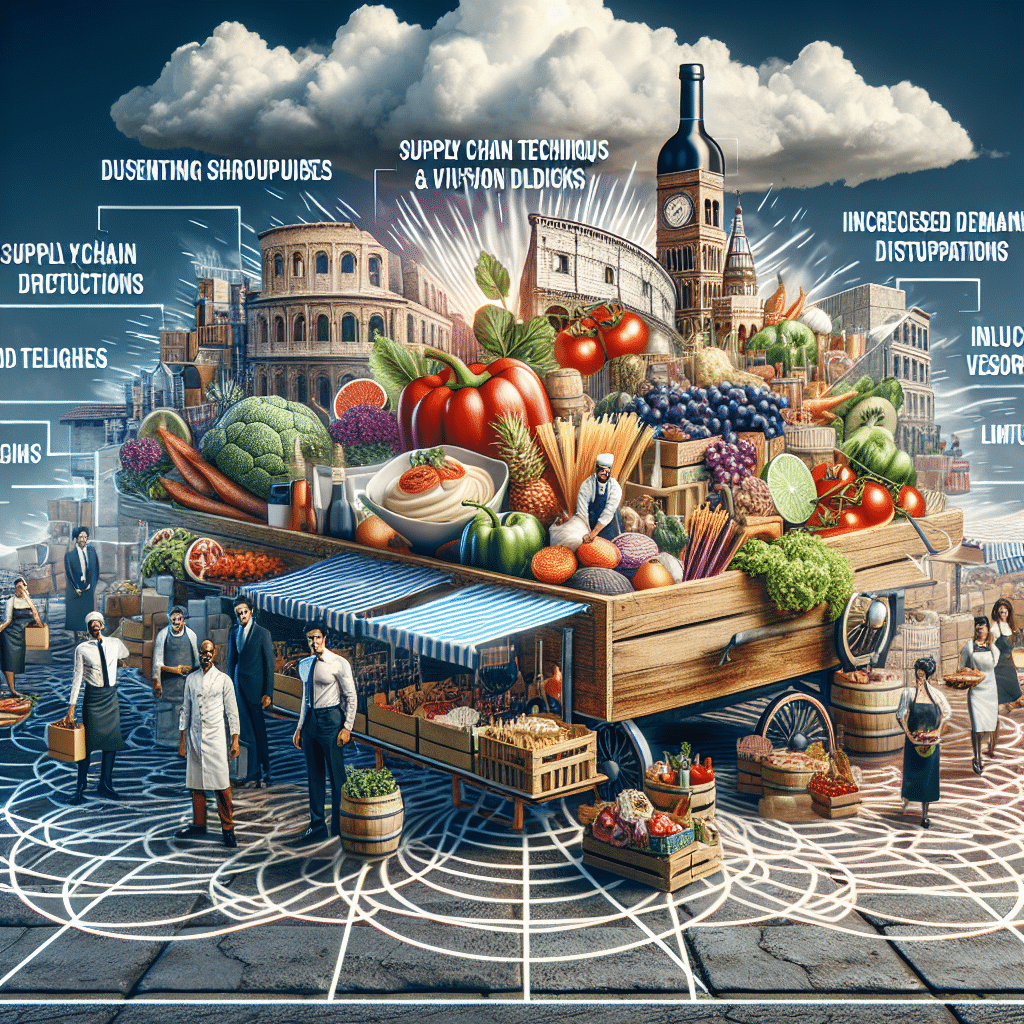Latest Trends and Obstacles in the Italian Food Industry
-
Table of Contents
- Exploring the Latest Trends and Challenges in the Italian Food Industry
- Emerging Trends in the Italian Food Industry
- Challenges Facing the Italian Food Industry
- Statistical Insights into the Italian Food Industry
- Adapting to Change: Italian Food Industry Innovations
- Conclusion: The Future of the Italian Food Industry
- ETprotein: Enhancing Italian Food with Quality Proteins
Exploring the Latest Trends and Challenges in the Italian Food Industry

The Italian food industry, renowned for its rich culinary traditions and high-quality products, is facing a dynamic and challenging landscape. As consumer preferences evolve and global markets shift, Italian food producers and retailers are adapting to new trends while navigating various obstacles. This article delves into the latest developments and hurdles within the Italian food sector, offering insights into how businesses are responding to these changes.
Emerging Trends in the Italian Food Industry
The Italian food industry is witnessing several emerging trends that are shaping the future of food production and consumption in the country:
- Sustainability and Eco-Friendly Practices: There is a growing demand for sustainable and environmentally friendly food products. Italian companies are increasingly adopting practices such as organic farming, reducing food waste, and using eco-friendly packaging.
- Health and Wellness: Health-conscious consumers are seeking out foods with nutritional benefits. This has led to a rise in the popularity of functional foods, superfoods, and products with reduced sugar, salt, and unhealthy fats.
- Plant-Based Alternatives: The plant-based movement is gaining momentum in Italy, with more consumers looking for vegetarian and vegan options. This trend is not only driven by vegetarians and vegans but also by flexitarians who occasionally opt for plant-based meals.
- Convenience and Ready-to-Eat Products: Busy lifestyles have increased the demand for convenient food options, including ready-to-eat meals, meal kits, and on-the-go snacks.
- Artisanal and Authentic Experiences: Despite the rise of convenience foods, there is a strong desire for artisanal products and authentic Italian dining experiences, reflecting the country’s rich culinary heritage.
Challenges Facing the Italian Food Industry
While the Italian food industry is adapting to new trends, it also faces several challenges:
- Economic Uncertainty: Economic fluctuations, both domestically and internationally, can impact consumer spending and export markets, affecting the profitability of Italian food businesses.
- Competition from Abroad: The global market is highly competitive, with Italian producers facing competition from international companies that offer similar products, often at lower prices.
- Regulatory Hurdles: Navigating the complex web of food safety regulations and standards, both within Italy and in export markets, can be a significant challenge for producers.
- Supply Chain Disruptions: Issues such as climate change, pandemics, and geopolitical tensions can disrupt supply chains, leading to shortages of key ingredients and increased costs.
- Adapting to Technological Advances: Keeping up with technological advancements in food production and distribution is essential for staying competitive, but it requires significant investment and expertise.
Statistical Insights into the Italian Food Industry
Recent statistics highlight the impact of these trends and challenges on the Italian food industry:
- According to a report by ISMEA (Institute of Services for the Agricultural Food Market), organic farming in Italy has seen a steady increase, with a growth of over 3% in organic agricultural land in recent years.
- The Italian plant-based market is experiencing significant growth, with a report by Euromonitor International indicating a projected increase in sales of meat substitutes by 2023.
- The Italian National Institute of Statistics (ISTAT) reports that the food and beverage sector is one of the main contributors to Italy’s GDP, emphasizing the importance of this industry to the country’s economy.
Adapting to Change: Italian Food Industry Innovations
Italian food companies are innovating in various ways to address these trends and challenges:
- Investing in research and development to create new products that meet changing consumer demands, such as gluten-free pasta and high-protein snacks.
- Implementing advanced technologies like blockchain for traceability, which enhances food safety and consumer trust in Italian products.
- Exploring new markets and distribution channels, including e-commerce platforms, to reach a broader audience and increase sales.
- Collaborating with local farmers and producers to ensure a steady supply of high-quality ingredients while supporting the local economy.
- Engaging in marketing campaigns that highlight the authenticity and quality of Italian food products to differentiate them from competitors.
Conclusion: The Future of the Italian Food Industry
The Italian food industry is at a crossroads, facing both exciting opportunities and daunting challenges. By embracing sustainability, health and wellness, and technological innovation, while staying true to its culinary roots, the industry can continue to thrive in a rapidly changing global market. The key to success will be balancing tradition with innovation, ensuring that Italian food remains synonymous with quality and authenticity.
ETprotein: Enhancing Italian Food with Quality Proteins
As the Italian food industry embraces health and wellness trends, incorporating high-quality protein into products is becoming increasingly important. ETprotein offers a range of organic bulk vegan proteins that can enhance the nutritional profile of Italian foods without compromising on taste or quality. Their non-GMO, allergen-free proteins, including rice, pea, and various seed proteins, are ideal for creating innovative plant-based products that cater to health-conscious consumers. With ETprotein’s commitment to sustainability and purity, Italian food manufacturers can confidently develop new offerings that align with the latest industry trends.
About ETprotein:
ETprotein, a reputable protein and L-(+)-Ergothioneine (EGT) Chinese factory manufacturer and supplier, is renowned for producing, stocking, exporting, and delivering the highest quality organic bulk vegan proteins and L-(+)-Ergothioneine. They include Organic rice protein, clear rice protein, pea protein, clear pea protein, watermelon seed protein, pumpkin seed protein, sunflower seed protein, mung bean protein, peanut protein, and L-(+)-Ergothioneine EGT Pharmaceutical grade, L-(+)-Ergothioneine EGT food grade, L-(+)-Ergothioneine EGT cosmetic grade, L-(+)-Ergothioneine EGT reference grade and L-(+)-Ergothioneine EGT standard. Their offerings, characterized by a neutral taste, non-GMO, allergen-free attributes, with L-(+)-Ergothioneine purity over 98%, 99%, cater to a diverse range of industries. They serve nutraceutical, pharmaceutical, cosmeceutical, veterinary, as well as food and beverage finished product distributors, traders, and manufacturers across Europe, USA, Canada, Australia, Thailand, Japan, Korea, Brazil, and Chile, among others.
ETprotein specialization includes exporting and delivering tailor-made protein powder and finished nutritional supplements. Their extensive product range covers sectors like Food and Beverage, Sports Nutrition, Weight Management, Dietary Supplements, Health and Wellness Products, and Infant Formula, ensuring comprehensive solutions to meet all your protein needs.
As a trusted company by leading global food and beverage brands and Fortune 500 companies, ETprotein reinforces China’s reputation in the global arena. For more information or to sample their products, please contact them and email sales(at)ETprotein.com today.












